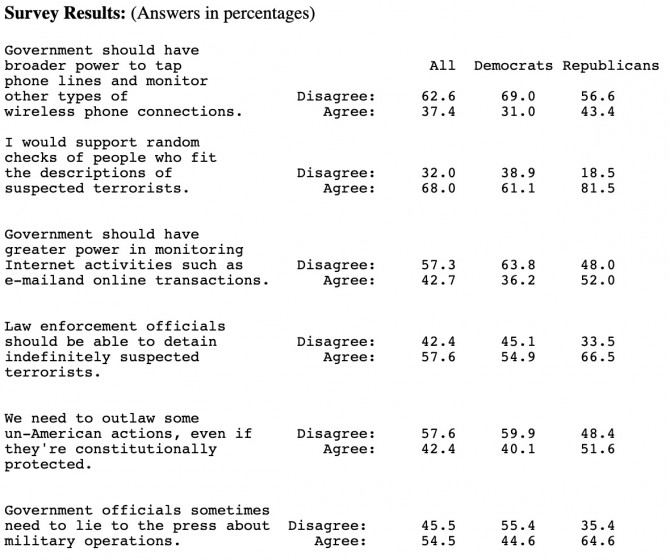Americans support maintaining civil liberties during war on terror, Cornell survey finds
By Blaine Friedlander
When the Patriot Act passed Congress weeks after the Sept. 11, 2001, attacks, federal law-enforcement officials received more power to eavesdrop on telephone calls, secretly monitor e-mail communication and find out what library-card holders have been reading. Now a majority of Americans are claiming that these new government powers infringe upon civil liberties, according to a national survey conducted by Cornell University's Department of Communication.
More than 60 percent of Americans oppose tapping phone lines and wireless phone connections as part of the war on terrorism, the survey found. Nearly 60 percent oppose monitoring e-mail, and the same percentage oppose outlawing constitutionally protected actions, even if some consider these actions "un-American."
"This clearly shows that Americans are more and more concerned about their civil liberties in a post-Sept. 11 world," says Dietram Scheufele, Cornell assistant professor of communication and principal investigator of the study. "Recent federal policies, such as the Patriot Act or the Defense Department's proposed Total Information Awareness program, increasingly infringe upon rights and freedoms that people once took for granted, and Americans are increasingly aware of the trade-off between civil liberties and national security."
At the same time, however, a majority of Americans surveyed supported random checks based on racial profiling of suspected terrorists (68 percent) and the indefinite detention of suspected terrorists (about 57 percent).
About 54 percent of all Americans questioned agreed with the idea that the government sometimes has to lie to the press about military operations. More than 70 percent, however, felt that the media should not be prevented from covering anti-war protests or the comments of individuals critical of the government. "It seems that Americans understand the military's interest in keeping certain information to itself and not make it publicly available. That does not mean, however, that people support censorship, self-imposed by the media or enforced by the government," says Scheufele. People who define themselves as either Democrats or as Republicans differ dramatically in their assessment of measures taken by the Bush administration's war on terrorism, however. About 55 percent of Democrats said they were opposed to the idea that the government sometimes has to lie to the press about military actions, in contrast to about 64 percent of Republicans who supported that idea.
Nearly two-thirds (63.8 percent) of Democrats surveyed said the government should not have greater power in monitoring e-mail and other Internet activities, but 52 percent of Republicans felt that greater government power in those areas is a good idea. Almost 60 percent (59.9 percent) of Democrats also were opposed to outlawing "un-American" actions, even if constitutionally protected, whereas a slight majority of Republicans (52 percent) were willing to sacrifice constitutional protections for security.
The results are based on a national telephone survey of 787 adults, which had a 55 percent response rate and a margin of error of plus or minus 3.5 percent. The fieldwork was conducted by the Cornell's Computer-Assisted Survey Team.
Media Contact
Get Cornell news delivered right to your inbox.
Subscribe